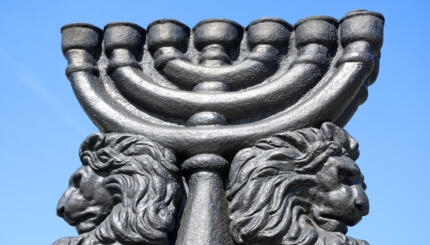The Binding of Isaac, known in Hebrew as the Akedah, is one of the best known — and most troubling — stories in the Bible. In it, God orders Abraham to sacrifice his son, Isaac, on Mount Moriah. Abraham agrees, but then is stopped at the last minute when God sends an angel who tells him to sacrifice a ram instead.
The story, in Genesis 22:1-19, is traditionally read on the second day of Rosh Hashanah, and references to it appear throughout the Rosh Hashanah liturgy. Even the shofar (ram’s horn) blown on the holiday is said to be a reminder of the Akedah, and how Isaac was spared.
The story appears in Parashat Vayera, the fourth portion in the annual Torah-reading cycle. Parashat Vayera includes not just the Akedah, but the birth of Isaac, Sarah’s banishment of Hagar and Ishmael, and the destruction of Sodom and Gomorrah. Abraham’s action upon learning of the destruction of Sodom and Gomorrah — arguing with God and urging him to save at least some of the city’s residents — is often contrasted with his passive and obedient response to the order to sacrifice his own son.
The following commentaries on My Jewish Learning address the Binding of Isaac:
With your help, My Jewish Learning can provide endless opportunities for learning, connection and discovery.
Balancing the Needs of Home and Community
Autonomy vs. Heteronomy in the Covenantal Relationship
Seeing the Ram
Sarah and the Akedah
A summary of the “Binding of Isaac” (excerpted from My Jewish Learning’s summary of Parashat Vayera) appears below. To read the full text in Hebrew and English, click here: Genesis 22:1-19.
And it came to pass that God tested Abraham and said to him, “Abraham.”
“Here I am,” Abraham responded.
God said, “Take, I beg of you, your only son whom you love, Isaac, and get yourself to the land of Moriah and offer him on one of the mountains.”
So Abraham did as he was told, journeying with his wood for the offering and with his son and his servants to the place that God had told him. On the third day, Abraham and Isaac left the servants and took the wood for the offering, some fire and a knife. So they went, both of them, together.
Isaac spoke to his father, Abraham, “My father!”
Abraham said, “Here I am, my son.”
“Here is the fire and the wood, but where is the lamb for the offering?” asked Isaac.
”God will see that we have a lamb for the offering, my son.”They came to the place of which God had spoken, and Abraham built the altar and arranged the wood and bound Isaac, his son, and placed him on the altar upon the wood. And Abraham stretched forth his hand and took the knife to slaughter his son. And an angel of God called to him from heaven and said, “Abraham! Abraham!”
“Here I am!” said Abraham. And God said, “Do not stretch your hand toward the lad, nor do the slightest thing to him, for now I know that you are God-fearing and did not withhold from Me.”
Abraham lifted up his eyes and looked and lo! There was a ram caught in the hedge. Abraham took the ram and offered it up as offering in place of his son. Abraham named this place, “God sees.”
An angel of God called to Abraham a second time out of heaven and said, “By Myself have I sworn, says God, because you have done this thing and not withheld from Me your son, your only son, that I will bless you without fail, and without fail multiply your descendants as the stars in heaven and as the sand that is on the seashore, and your seed shall inherit the gate of its enemies. And all the nations of the earth shall bless themselves through your seed, as a consequence of your having hearkened to My voice.”
Then Abraham and Isaac and the servants returned to Beer Sheva.
Rosh Hashanah
Pronounced: roshe hah-SHAH-nah, also roshe ha-shah-NAH, Origin: Hebrew, the Jewish new year.



